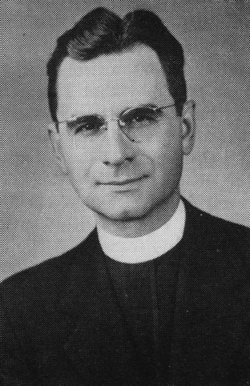
On the whole I consider that the date A.D. 33 April 3 offers fewer difficulties than any of the
others, but my ambition has been rather to explain the character and tendencies of the different
lines of evidence than to arrive at a conclusion, and I believe, as I certainly hope, that my opinionhas in no part of the discussion been biased by the desire to support any particular conclusion. J.K. Fotheringham 1934

Those of us who studied at Loyola University in the 1970's remember Father Filas, S.J. as one of the pivotal scholars in the study of the historical Jesus, based upon his deep scrutiny of the Shroud of Turin. Father Filas seemed to be Loyola's show-horse. I never had the opportunity to study with Father Filas, but many of my pals had the pleasure. We were the south side L-crowd and took classes in the old brown stone Lewis Towers and the now long gone Marquette Center which was accessed by a bridge over Rush. I missed out on Father Filas.
There were others, many other: Dr. Francis Swarzenberg, Dr. Larry McCaffery (Leo '43), Father Charles Ronan & etc.
I recall taking classes and a senior seminar on English histor from the War of Roses to the Stuarts with Dr. Lionel Trimble. Dr. Trimble was an exacting scholar who expected no less than exacting work from this former member of Janitors Local #25 and a senior hoping to graduate on time with Mike Manske, James "Molly" Molloy, Mike Miller, Mary Kay Harvey, Joe Phelps and Rita Buckley, with whom he had begun his baby steps on the scholastic throw rug.
Dr. Trimble argued for the very best sources, as the only key to unlocking the past. Paper and parchment crumbles, rots, burns and tucks neatly away in places meant to shun the eyes of the curious. Censorship, neglect, wars, pestilence and the ancient examples of losing the TV remote affected history as well.
We must always be careful about jumping to conclusions - Irish Inquiry.
We must always be sceptical of partisanship when it comes to memory - Irish Alzheiners.
We must always look to 'the best sources.' One is an excerpt, unearthed, so to speak, and reprinted in Real Clear History,
Early this morning of good Friday, I finished reading a great old piece of scholarship by J.K. Fotheringham (14 August 1874 – 12 December 1936). John Knight Fotheringham was a British scholar of Middle Eastern history and religious history.
Fotherigham dove into the deep end of the pool and came up with treasure chest packed with scholarship: Hebrew, Greek, Latin and Aramaic sources that includes Josephus, the Synoptic Gospels, as well as the Gospel of John, Tacitus, Annidazugga, as well as, what we should call, modern (His contemporaries) studies.
This is a dense read. It is slow going. It was just like the dusty texts and manuscripts dumped in my mitts by Dr. Lionel Trimble concerning that nasty son of a bitch Perkin Warbeck. Yet, we arrive at a scholar's conclusion. April 3, A.D. 33.
The primary morals of an undergraduate, wearing Orchestra Hall janitor's wear, come back and I nod with conviction. Old Johnny Knight Fotherington nailed it. Maybe.





No comments:
Post a Comment